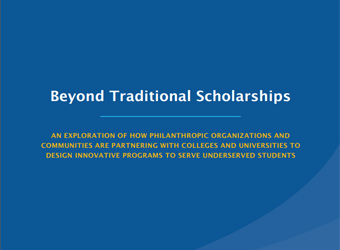 For many students, scholarships are an important piece of how they will pay for college. Yet there are challenges with traditional scholarship models.
For many students, scholarships are an important piece of how they will pay for college. Yet there are challenges with traditional scholarship models.
Overall, current scholarship models may not be tailored to fit unique community needs. Financial aid can fall short for traditionally underrepresented students. There also tends to be a focus on incoming first-year students only, which means many scholarship models are not structured to support retention and completion.
FCAN’s Kathy McDonald, assistant director of network partnerships, was recently joined by Helios Education Foundation’s Paul Perrault, PhD, vice president and director of research and evaluation, and Michelle Boehm, research and evaluation analyst, to explore how communities can rethink their scholarship models by leveraging what’s working in other regions during a webinar titled, “Scholarship Innovation: How Funders and Communities are Meeting the Needs of Today’s Students.” Newer models seek to address limitation that both funders and students face with traditional scholarships.
The Challenge for Funders
- Scholarship criteria specified by donors can be too narrow to attract a sufficient applicant pool.
- Tracking outcomes is difficult — did the student graduate and get a job in their field of choice?
- Administrative costs can be high.
The Challenge for Students
Scholarships rarely cover all expenses for their full program, which leaves students scrambling each year looking for new scholarships. Additionally, student financial needs often extend beyond tuition and books to now include transportation, housing, food scarcity and healthcare.
Key Takeaways from FCAN Webinar
There are several major domains of scholarships innovative funders are trying:
- Emergency scholarships — address unexpected hardships that threaten a student’s ability to persist and complete.
- Performance-based scholarships — provide aid for low-income students that is contingent on completion of certain academic benchmarks paid directly to students, often disbursed in multiple increments throughout the term.
- Wrap-around scholarships — take a holistic approach to include supports like mentoring, tutoring, academic and career counseling, and internship placements.
- Promise scholarships — are institutional or place-based initiatives that provide funding for students who live in the program’s geographic area.
Many of these models are so new that students may not have finished their credential, so career outcomes are not yet known. However, many are looking promising because of their ability to support persistence in college.
The Qualities of Effective Scholarship Models
Finally, scholarship models are most impactful when they are:
- Renewable — so they can support a student for the duration of earning their credential.
- Predictable — so that students know they can count on the financial support and don’t have to go scrambling.
- Simple and transparent — so that students can readily understand whether they qualify.
- Supplement institutional funds — so that the scholarships can fill in the funding gaps that are not covered through other sources.
- Incorporate incentives for academic success — to encourage completion.
- Include non-financial support services — to meet the non-academic needs such as housing or transportation.
To learn more, listen to the recording from the webinar and check out the handouts that accompanied the presentation.
Webinar Resources
Helios Education Foundation Beyond Traditional Scholarships
Recording I Slides
Handout: Financial Aid Lessons from the Field
Handout: What is a Promise Scholarship
Be sure to visit our Past Webinars page for access to recordings and downloadable material from FCAN’s previous presentations.
